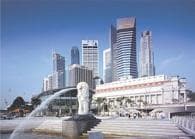
SINGAPORE (Nov 22): Singapore says a global slowdown in the final months of the year will cap full-year economic growth at about three percent before an uneven recovery in 2015.
The island’s expansion will probably ease after gross domestic product rose 3.3 percent in the first three quarters from a year earlier, the Ministry of Trade and Industry said today.
GDP grew 2.8 percent in the three months through September from a year earlier, and gained an annualized 3.1 percent from the second quarter, more than an October estimate.
“Externally-oriented sectors such as the manufacturing and transportation and storage sectors are likely to slow,” the ministry said.
“While global growth is expected to pick up modestly in 2015, the pace of recovery is likely to remain uneven across the economies.”
Singapore’s export-dependent economy faces a mixed global environment where the boost from a strengthening recovery in the US is being countered by weaknesses in Europe, Japan and China, whose central bankers have been forced to undertake monetary stimulus to revive growth.
Non-oil domestic exports will probably contract between one percent and 1.5 percent this year, the government said today.
“There’s a realization that the strong recovery that most people had anticipated is not materializing,” said Irving Seah, an economist at DBS Group Holdings in Singapore.
“The recovery path in the US has been very patchy versus what we’d predicted earlier. Moreover, we’re seeing increased risk from the euro zone. Japan has entered a technical recession, and growth momentum in China’s moderating.”
Singapore’s growth outlook for 2015 “remains modest,” with a tight labour market domestically restraining construction, retail and food services, the trade ministry said, forecasting GDP expansion of two percent to four percent.
Manufacturers on the island are adjusting to a slower inflow of foreign labour as Prime Minister Lee Hsien Loong pushes them to reduce their reliance on cheap overseas workers.
“There are concerns that the euro zone economy will fall into a deflationary spiral, given its weak growth and persistent low inflation,” the ministry said.
“An unexpected tightening of monetary conditions would weigh significantly on US financial markets and business sentiments,” it said.
It also cited risks from geopolitical tensions involving Russia and Ukraine, and key oil producers in the Middle East and North Africa, as well as the possibility of a global Ebola outbreak.
The Monetary Authority of Singapore, which uses the island’s dollar to manage price pressures, said on Oct 14 it will maintain a modest and gradual appreciation of the currency as it cut its forecast for inflation this year.